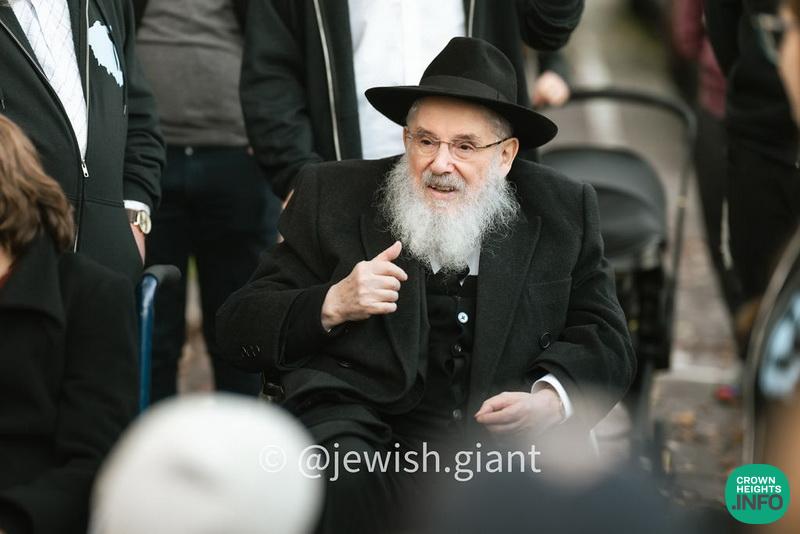
Weekly Story: A Promise Made A Promised Kept
by Rabbi Sholom DovBer Avtzon
We are about to celebrate Pesach, celebrating our exodus and freedom from the first exile that the Jewish people experienced, and anticipating the ultimate redemption from the final exile, which we are experiencing now.
The following thought I heard this past Shabbos from Rabbi Nissim Mangel Sheyichye. As always, your feedback and comments are greatly appreciated and most welcomed.
This weeks post is in honor of a member of Tzivos Hashem, Yaakov Shaul ben Chanah Miriam, may he merit speedily a complete recovery.
Sometimes we say something, and some may respond, that is based on the ways of Chassidus, if you can prove it to me from Nigla, than I would accept it. In fact this was said to the Alter Rebbe himself, when he met with three of the great Rabbonim who sided with the misnagdim. So we will discuss the following concept from a Gomorah.
The Gemorah in Kesubos 103b notes, that before Rav Yehudah the Hansi (commonly referred to as Rebbi) was nistalek, he said my son Shimon is very wise and my son Gamliel is going to become the Nasi after me, while my student Chanina bar Chamah is going to sit and serve as the Rosh [head of the] Yeshiva.
The Gemorah then mentions, that although Rav Chanina bar Chama was appointed, out of His humilty he refused to assume that position. He explained that Rav Efes was two and a half years older than him, and [in his humility] he felt that Rav Efes was more deserving than he.
So Rav Efes entered the study hall and gave the classes, while Rav Chanina studied outside. This way no one would look up to him and give him respect instead of giving it to Rav Efes.
Some years passed and Rav Efes was niftar. Only at that time did Rav Chanina assumed the position and became the Rosh yeshiva.
Levi then realized he no longer had someone to learn with, so he left Eretz Yisroel and went to Buvel, where he taught others. The halachah he taught was that a woman is allowed to go out with a crown on her head on Shabbos. When Rav heard that Levi came to Bavel he noted that apparently Rav Efes had passed away and therefore you Rav Chanina became the Rosh Yeshiva and Levi had no one to learn with, so he left EretzYisroel.
On this the gemorah asks and says how did Rav come to this conclusion? Perhaps Rav Chanina is the one that passed away and Levi had lost his study partner so he came to learn in Bavel. The second answer the Gemorah gives to this question is that being that you Rav Yehudah Hanasi stated that Rav Chanina was the one who should become the Rosh yeshiva, the words of a tzaddik do not fall short, and they will definitely be fulfilled even if it takes some years to happen.
So Rav Chanina for sure was going to become the Rosh yeshiva and the only way for that to happen is that Rav Efes would be the one who passed away first.
So if Rav Yehudah Hanasi merely stated his desire that Rav Chanina becomes the Rosh yeshiva, the Gemorah states that it must come to fruition, how much more so is it concerning the statements of our Rebbe, that we are in the era of Moshiach and Moshiach is waiting to reveal himself and redeem us from this exile, his promise undoubtedly has to and will be fulfilled!
May it be speedily in our days.
A Taste of Chassidus Bichol Dor Vudor, Chaiyuv Adam Lirois ess Atzmoi 5734
The simple explanation of these words is that every year on the night after the 14th of Nissan, a person is obligated to remember and celebrate the Exodus that Hashem took us out of the bondage of mitzrayim, on this night. This is also what the Rambam writes, that by the seder a person is obligated to demonstrate that he left Mitzrayim. Because of this the halachah is that we recline, have expensive utensils and do additional aspects at the seder table.
In general, there are a few components in this mitzvah; the first one is that on the anniversary of our Exodus we describe in detail Hashem’s wonderous ways and the miracles He did for us. The second one is, as the Alter Rebbe notes in Tanya, that it’s not only an obligation once a year, but he adds, that we are supposed to remember it everyday, while the third aspect is that it is going to be mentioned even when Moshiach comes.
The question is, being that when Moshiach comes the world is going to be on a much higher level, that everyone even non-Jews, will see how Hashem’s words are giving life and existence to the world, so why would it be necessary and more importantly what would be accomplished by mentioning and describing the Exodus of Egypt? [As our sages say, being that the miracles that will precede the final redemption will be much greater than those Hashem preformed when He took us out of Mitzrayim, there would not be a need to celebrate Pesach, because they would pale in comparison to the miracles Hashem will do when He redeems us from this exile.
As is in every mitzvah, commemorating and celebrating Yetzias Mitzrayim, is not just eating the seder meal and saying what happened, but also contemplating on its meaning and applying it to our life.
The Hebrew letters that compose the word mitzrayim, also spell out the word meitzurim, which means limitations. So by extension, yetzias mitzrayim means each one of us are to strive and achieve, going out of our personal limitations. This aspect is a constant mitzvah, every day, while the seder takes place on the anniversary of our Exodus. The only part that now has to be explained is the third aspect as to why there is a need to mention it after Moshiach already came and elevated the entire world.
The purpose of creation is to remove the apparent limitations of revealed G-dliness in this world.
If Hashem’s glory would have been revealed when He created the world, then the world as is known now would not have been able to be in existence. The world as we know it is an entity, and many feel they can do as they wish, since they have no obligation to another entity. If they would know the truth and feel or better said recognize that their existence is completely depended on Hashem, everyone would conduct themselves as a perfect angel. After all, if I disobey Hashem, I will no longer receive my life sustaining line.
But Hashem’s desire is that we serve Him because we desire to do so, not because we are forced to, and therefore He concealed Himself, so we don’t automatically see Him. Instead, we can say the world is conducted by rules of nature. This initial concealment is what gave the possibility for someone to say there is no G-d whatsoever. And our mission is to reveal to the world that the initial concealment was self-made, and not that another entity forced this concealment, as there is no other entity besides Him. In other words, the person has to elevate themselves above conducting themselves in a natural way.
Conducting oneself above nature, is expressed in the Torah in the first parsha of Shema, with the words of u’vichol mi’ohdeicha – with all you might, higher than nature.
This is the reason why the third parsha of Shema, mentions yetzias mitzrayim; for as mentioned this phrase also means going out of your limitations, and that is accomplished when one serves Hashem on the level of u’vichol mi’ohdeicha.
Therefore, when a person conducts themselves in a manner that is higher than nature, the person is revealing the truth, that Hashem’s presence is really present in this world, just that we humans failed to see it. But now that we go higher than nature, we recognize and see this truth. That will cause the revelation of Moshiach, and at that time the prophet states that the physical flesh of al humans will see how Hashem is giving life to the entire world.
As noted, the nature of a human feels that they are self-sustaining and are not dependant on any other entity, so subsequently there can be a feeling of one can do as they choose. But conducting oneself above nature means, that nevertheless, the person controls this impulse and conducts themselves in the manner that Hashen guides us to do.
In Chassidic terminology, that is called the service of Iskafya, controlling my own desire and obeying Hashem. Doing so, demonstrates that Hashem is truly present in this physical world and that ushers in the era of Moshiach, when one won’t have any desire but to serve Hashem.
Nevertheless, even when we will be at that exalted level, that we won’t have our personal desire, we will mention and remind ourselves that we merited this level, through our service of going beyond our nature, and that is why we will mention yetzias mitzrayim, even when Moshiach will redeem us.
May it be speedily in our days.
Rabbi Avtzon is a veteran mechanech and the author of numerous books on the Rebbeiim and their chassidim. He is available to farbreng in your community and can be contacted at avtzonbooks@gmail.com.














Mushkie
Isn’t there a talmudic story that the baby daughter of a sage was asked by her father whom she wants to marry of the two students that sat in front of him? She said, both. Said one student, let me be the second. Sure enough she married one and after he died she married the other, second, just as they spoke. Words of tzaddikim always come true.